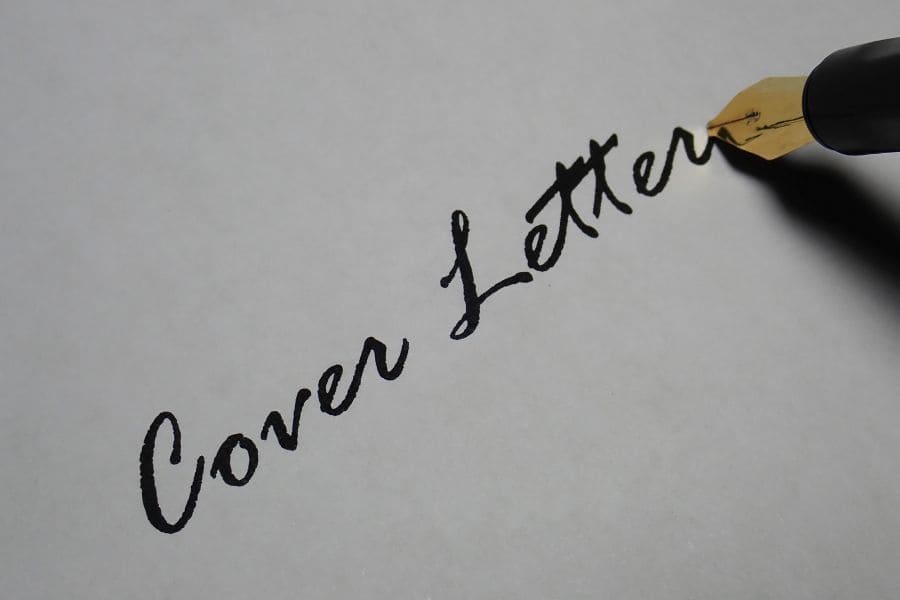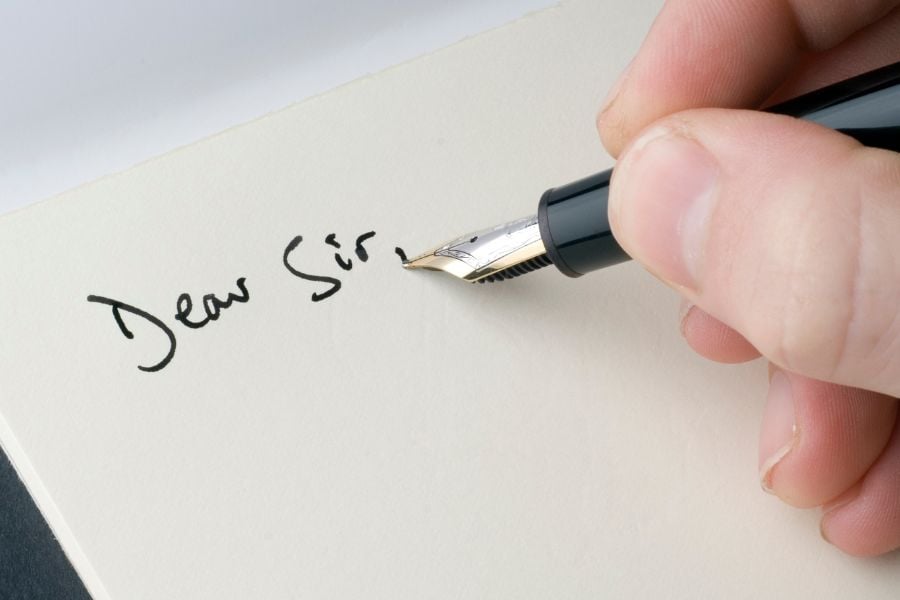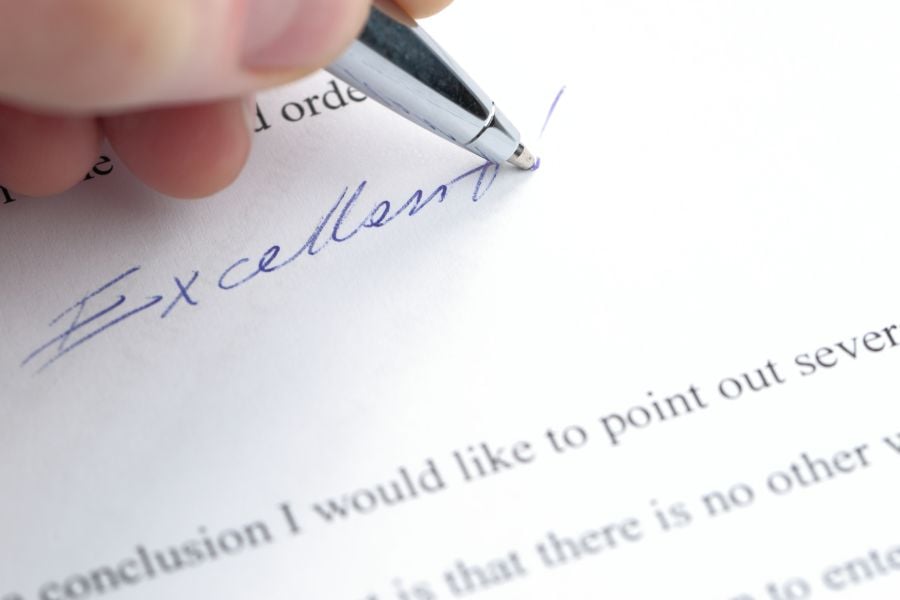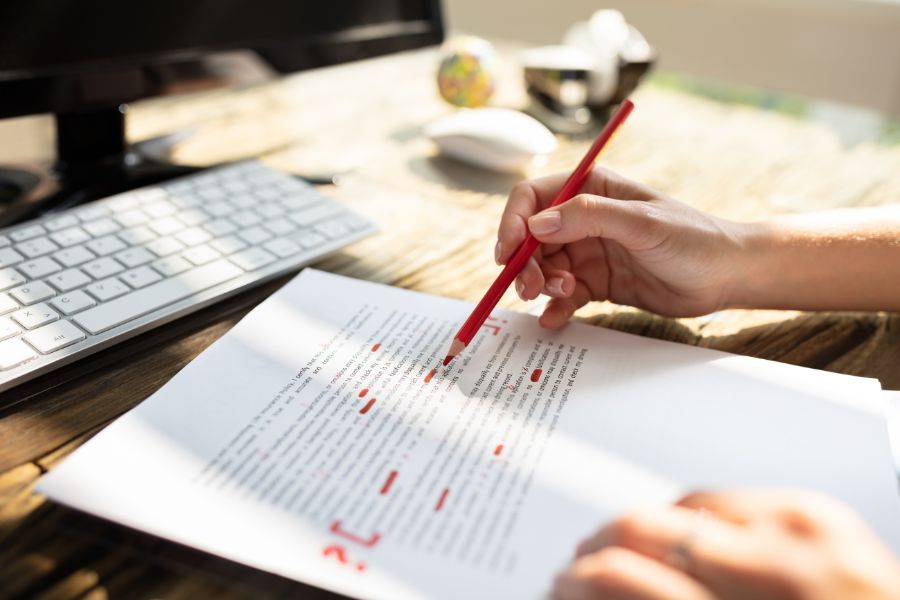Looking to land your dream job?
It all starts with knowing how to write a cover letter that outshines the competition.
A great cover letter can be your ticket to catching the eye of a hiring manager and getting one step closer to your dream job.
In this post, we’ll provide you with hands-on strategies and examples that’ll make your cover letter a masterpiece.
So, are you ready to write a cover letter that’s going to make recruiters stop and take notice?
Let’s dive right in!


Crafting The Perfect Cover Letter in 6 Simple Steps
You’ve completed a job search, found the perfect job posting, and written your resume. So, you’re ready to submit your job application, right?
Not so fast.
You need an effective cover letter to accompany your job application.
So, first things first, let’s nail down the basic format of a cover letter…
Now, a cover letter isn’t just a free-form letter, it’s a structured piece of writing with distinct sections that is submitted with your resume. Think of it like a mini-story.
Here’s a handy structure to follow:
- Salutation: Address the hiring manager directly. If you can’t find their name, “Dear Hiring Manager” works too.
- Opening Paragraph: Hook the reader, convey your enthusiasm, and state the position you’re applying for.
- Second Paragraph: Dive into each relevant skill and experience.
- Third Paragraph: Show how you’ll bring value to the company and why you’re a great fit.
- Closing Paragraph: Thank the reader, express your eagerness to continue the conversation, and provide your contact details.
- Sign-off: Finish professionally with “Best regards,” “Yours sincerely,” or “Thank you,” and your name.
Seems like a breeze, right? Well, let’s get into the nitty-gritty of each part.
Step 1: Start Off With The Right Salutation
The salutation might seem like a small part of your cover letter, but it’s your first interaction with the reader.
Just think about it, how does it feel when you see your name written out? Feels personal, doesn’t it? Just like in a good conversation, using the hiring manager’s name shows you care enough to pay attention.
Use “Mr.” or “Ms.” followed by their last name to keep it professional.
For instance, if the hiring manager’s name is James Wright, you could start your letter with “Dear Mr. Wright,”.
If you can’t find a name after a diligent search, go for a generic but professional, “Dear Hiring Manager,”.
Step 2: Make an Entrance with Your Opening Paragraph

Your first paragraph is like the curtain rising on a stage.
You’ve got to grab the reader’s attention from the first line. Start with stating the role you’re applying for and where you found it, but spice it up a bit.
For instance, instead of writing, “I am applying for the marketing manager position I saw on LinkedIn,” try something like, “As a passionate and dedicated marketer, the opportunity to serve as the marketing manager at your esteemed company, which I discovered on LinkedIn, caught my eye.”
See the difference? The latter shows enthusiasm and injects personality into the mix.
Step 3: Showcase Your Skills in the Second Paragraph
Here, you’re taking center stage.
Now, don’t just say you’re great — prove it. Give real-world examples of how you’ve used each skill to make an impact.
For example, if the job description states problem-solving skills, don’t just say you have them. Instead, tell a brief story about a specific time you solved a complex problem.
Like, “At my previous role, I used my problem-solving skills to navigate a critical software issue that threatened to delay our product launch. By thinking quickly and leveraging my technical skills, I resolved the issue, ensuring the launch proceeded as scheduled.”
Step 4: Prove That You Were Made for Thee in Paragraph Three
This part is about the harmony, the perfect fit.
Show that you’re not only enthusiastic about the job but also understand the company’s culture and vision.
Say the company values sustainability, for example, mention how you led an eco-initiative at your previous job or volunteered for a green cause. This way, they’ll see you’re not just fit for the job, but also for their company culture.
Step 5: Close the Deal

This is the final stretch, the climactic ending.
Reiterate your enthusiasm for the role and express your desire to contribute to the team. Something like, “I am excited about the possibility of bringing my unique skills and experiences to your team, and I am confident that I could provide value from day one.”
And don’t forget to include your contact details! Make it easy for them to reach you when they want to extend that interview invite.
Step 6: Sign-off with a Cherry on Top
Just like a good dessert wraps up a meal, a strong sign-off concludes your cover letter.
Keep it classic with a “Best regards,” or “Yours sincerely,” followed by your full name. Adding your contact details below your name is a great touch.
Remember, your cover letter is your story. Each section, from the salutation to the sign-off, is an opportunity to show why you’re the best fit for the job. Make every word count!
Watch Out for These Common Cover Letter Pitfalls

Writing an effective cover letter can be nerve-wracking.
After all, there’s a lot riding on it!
But fear not, we’ve got you covered.
Here are some common mistakes you should steer clear of to ensure your cover letter hits the mark.
Addressing the Letter Incorrectly
Make sure you’ve got the right name and job title for your hiring manager.
A simple oversight here can come across as careless.
For example:
Addressing the letter to “Mr. Johnson” when the hiring manager’s name is “Ms. Johnson” shows a lack of attention to detail.
If you can’t find a name, “Dear Hiring Manager” is a safe bet.
Being Too Generic

Personalization is the name of the game when it comes to cover letters.
Avoid generic phrases like “I am a hard worker” and tailor your cover letter to each job and company you’re applying to.
For example:
Instead of saying “I have good communication skills”, say “In my previous role as a content marketing manager, I used my communication skills to coordinate a successful product launch that led to a 25% increase in sales.”
Remember, they’re hiring a person, not just a skill set.
Not Showcasing Your Skills Effectively
This isn’t the time for humility. You need to show the hiring manager what you’re made of.
Instead of saying, “I’m good at project management,” provide a specific example, such as “As project manager at my previous company, I led a team that successfully completed a six-month project two weeks ahead of schedule.”
But be careful not to exaggerate — honesty is just as important.
Not Explaining Why You’re a Good Fit
It’s not enough to say you’d be great for the job. You need to explain why.
Draw connections between your past work experience and the relevant skills needed in the job description.
Instead of saying, “I’m a great fit for this role,” say something like, “My experience in customer service and my ability to handle difficult situations make me an excellent fit for the role of Customer Service Manager.”
And don’t forget to mention why you’re drawn to the company and its culture.
Making It All About You

Yes, you’re showcasing your relevant skills and experiences, but remember, the ultimate goal is to show what you can do for the company.
So, instead of focusing solely on what you hope to gain from the work experience, highlight what you can offer.
For example:
Instead of “I hope to gain more experience in project management,” say “I am eager to use my project management skills to contribute to your team’s ongoing success.”
Neglecting to Proofread
This one might seem obvious, but it’s surprising how many people overlook it:
Make sure your cover letter is free of spelling and grammatical errors.
A typo-free cover letter shows attention to detail and professionalism.
For example:
A statement like “I’m detail-oriented” has a clear spelling mistake that will likely lead to a negative impression.
Ending on a Passive Note
Your closing paragraph is your last chance to impress the hiring manager.
Maintain an enthusiastic tone and express your eagerness to move forward in the process.
Instead of “I hope to hear from you soon,” use a more active and assertive phrase like “I look forward to discussing how I can contribute to your team.”
Using an Unprofessional Sign-off
Finally, remember to sign off professionally.
Use a traditional closing like “Best regards,” or “Sincerely,” followed by your name. Leave the “Cheers”, “Ciao”, and “Peace out” for your friends.
And Now You Know How to Write a Great Cover Letter
Crafting a good cover letter feels like balancing on a tightrope, right?
But hey, you’ve got this.
Remember, your cover letter is more than just words on a page.
It’s your story, your passion, your determination — all in a neat little package.
This guide has given you the toolkit to showcase your brilliance, so go ahead, submit that job application, and land your dream job.



